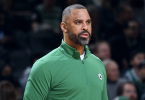By Alex Hemmer
BU News Service
BOSTON — Anna Choung is one of many women who can recall a time when she felt discriminated against by a financial professional, particularly when she and her husband sought advice for their financial well-being as a couple.
“I’m more financially savvy than my husband,” Choung, 37, told BU News Service. “[Yet] this Merril Lynch advisor asked my husband all the questions. I didn’t exist in his eye.”
In an era of #MeToo and where one of three leading presidential candidates is a woman, it may be frustrating to learn that men in America still have the upper hand when it comes to building personal wealth. From financial counseling to substantial investments, the sexism in the finance industry continues to be a problem.
Katherine Smith, a financial advisor at The Bulfinch Group in Needham, suggests that women have a harder time asking for advice on personal finance matters, and may miss out on opportunities to invest in their own as a result.
“I think [my] male clients tend to seek advice earlier. It’s okay to go to your guy friends in an already male-dominated industry,” Smith, 22, said, reflecting on her experience working with clients. “Women don’t want to be judged … salary negotiation, women almost never take part in stuff like that.”
Yet, even women who have reported seeking professional advice in the past two years struggle to find the resources they need. A survey conducted by New York Life Investments in 2018 revealed that women who seek advice spend more time switching between advisors before settling on one they can trust and build a relationship with.
Of the multiple reasons for switching advisors, 29% of women reported feeling a lack of personal connection with their advisor, and 27% cited poor customer service as an incentive to cut ties.
Despite a lack of suitable financial resources, women are said to be major players in the strength of the economy, reportedly controlling 51% of the country’s wealth, and even making up the majority of bachelor’s and master’s degree holders, the survey said.
Yet,
Sallie Krawcheck is one of many financial professionals who recognizes this problem. After years of working in the male-dominated sector of Wall Street, Krawcheck took matters into her own hands in 2015 by starting her own company, Ellevest, an app that encourages women to invest.
“Personal finance info aimed at women is a steady stream of condescending advice to restrain ourselves from overspending on ‘frivolous’ things like shoes or lattes,” Krawcheck told The New York Times in June. “Buy the damn latte, and don’t feel guilty about it.”
Krawcheck, who has racked up years of experience on Wall Street — most notably as CEO of Merril Lynch Wealth Management in 2009 and of Citi Wealth Management in 2007 — feels strongly about the need to target women with her app.
“We are the first to truly engage women around investing,” she explained to CNBC, pitching Ellevest. “You’ve been told your whole life that you’re not good with money, that money’s not for you. That’s not true.”
But encouragement to invest alone is not enough to close the wealth gap. Smith believes that before women can confidently come forward for help, they need to feel comfortable with not being able to identify the questions they might have.
“People don’t know what they don’t know,” she said. “It’s okay not to be knowledgeable about everything.”
Smith also believes that women should feel comfortable taking their time finding the right advisor and that frequently switching between financial professionals may be an empowering decision.
“Finding an advisor that fits you it should be like trying on clothes. Not everything fits. Not everything looks good. It’s not a one size fits all,” she added. “Do your research, ask people that know. Just [be] okay with saying that you don’t know something.”





